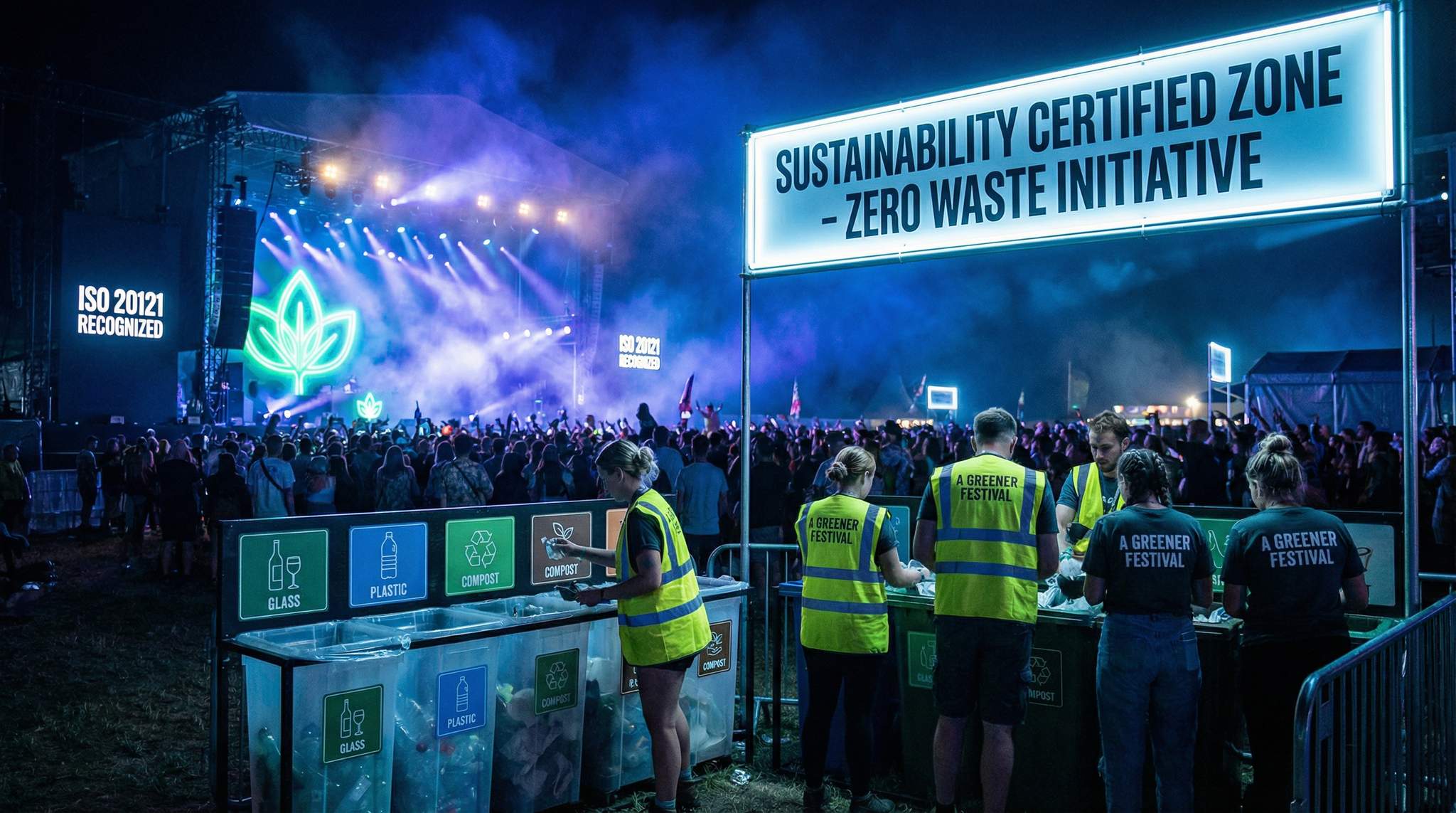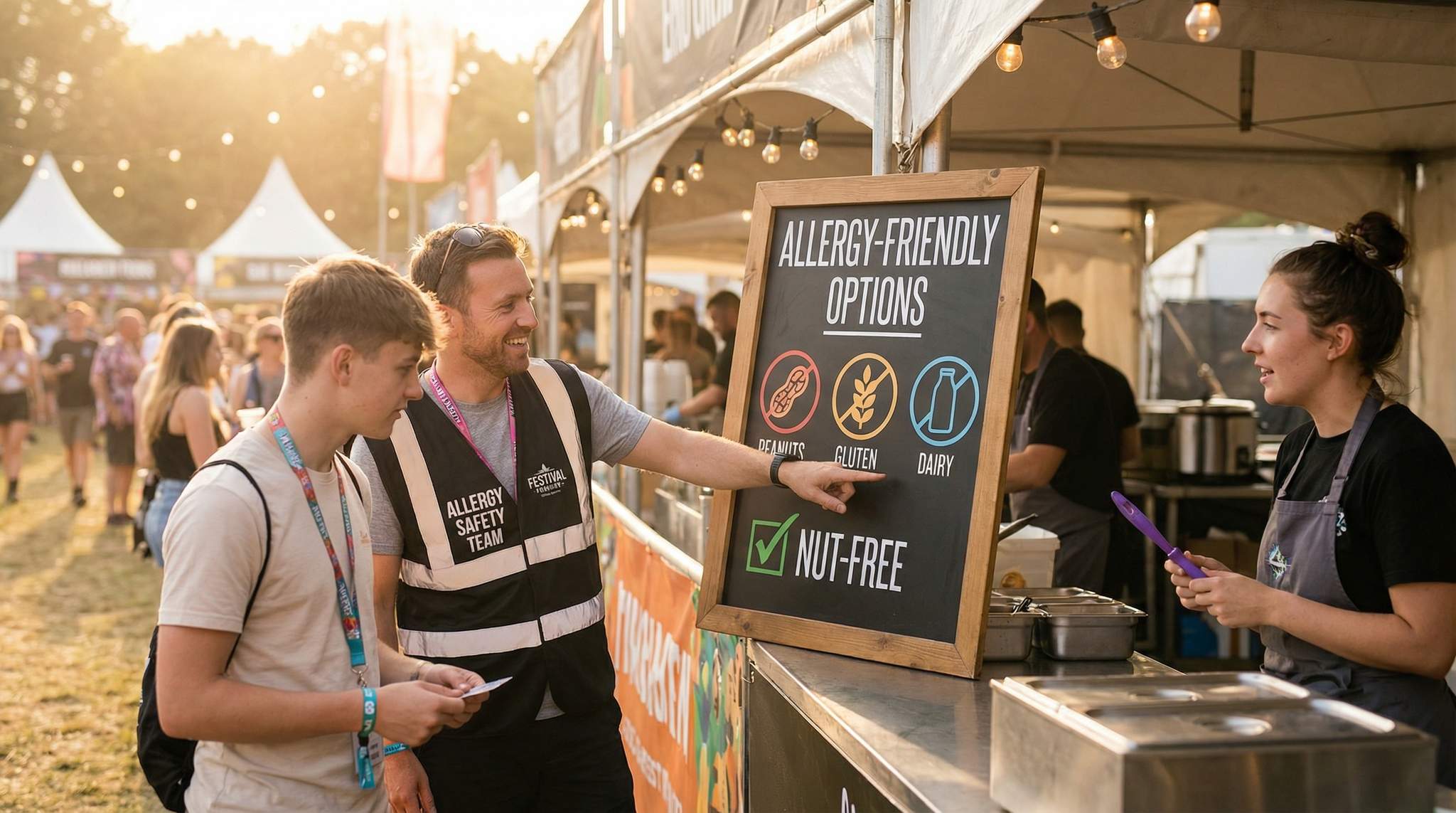Modern festival organizers face a challenge and an opportunity: how to reduce environmental impact while still delivering unforgettable experiences. One proven strategy for pushing boundaries in sustainable practices is to aim for recognized awards and certifications in event sustainability. These accolades – from global certifications like ISO 20121 to industry awards such as the A Greener Festival Award – do more than decorate a trophy shelf. They provide concrete frameworks, clear targets, and a healthy dose of motivation to achieve sustainability excellence. By understanding and pursuing these recognitions, festival teams can systematically improve their green credentials and inspire others to follow suit.
Recognitions That Drive Greener Events
A Greener Festival Award (AGF Certification)
This international award program is tailored specifically for events and festivals. Established in 2007, it has since assessed hundreds of festivals worldwide, providing independent audits that help events improve resource efficiency and reduce their environmental impact. Festivals entering the AGF program start by submitting a sustainability policy and completing a detailed self-assessment before the event. This self-assessment covers everything from local environmental impact (on the venue land and surrounding community) to global footprint areas (waste management, energy use, water and sewage plans, audience transport, etc.).
During the festival, trained AGF assessors conduct an on-site audit – meeting with the festival’s sustainability coordinator and contractors (e.g., the waste management team) and observing how green policies are put into action on the ground. After the event, organizers provide data and evidence (such as energy consumption figures, waste and recycling totals, audience travel surveys, and more). The festival is then evaluated across key categories – including energy, transport, waste, water, food & beverage, community/social impact, and overall governance (like carbon management policies).
Based on performance, the event can achieve different levels of recognition (ranging from an Improver designation for those just starting out, up through Commended and Highly Commended, to the highest Outstanding rating). Achieving any level is a credible mark of progress, and top performers earn the right to proudly use the AGF award logo along with recognition in press and industry circles. Perhaps more importantly, every participating festival – whether they earn an award or not – receives detailed feedback on what they’re doing well and what they could do better. In this way, the award process becomes a collaborative learning tool as much as a badge of honor, guiding festivals toward greater sustainability each year.
ISO 20121 Certification (Sustainable Events Standard)
ISO 20121 is an international standard for sustainable event management systems. Unlike an award given for a single event, ISO 20121 is a certification that an organization’s entire event planning and execution process meets rigorous sustainability criteria. It was developed around the time of the London 2012 Olympics to help large-scale events integrate sustainability into every aspect of management. Adopting ISO 20121 means a festival commits to a continual improvement cycle: setting a sustainability policy with clear objectives, implementing procedures to control impacts, monitoring performance, and engaging stakeholders (from suppliers to attendees) in the effort.
An independent accredited auditor checks that the festival’s management system complies with the standard, examining how the event addresses environmental, social, and economic aspects. For example, auditors will look for evidence of waste reduction and recycling, energy efficiency (perhaps use of renewable power sources), water conservation, and also social initiatives like accessibility and community involvement. Earning ISO 20121 certification is a significant achievement – it signals to the world that a festival has embedded sustainability into its DNA. One notable example is Lollapalooza Berlin, which in 2022 became the first festival in Germany to earn ISO 20121 after implementing over a hundred sustainability measures and undergoing a thorough independent audit, as detailed in Lollapalooza Berlin’s sustainability certification announcement. Certification isn’t a one-time effort either; the festival (or company) must maintain the standards and undergo periodic audits to retain ISO 20121, ensuring that green practices aren’t just a one-off project but an ongoing commitment.
Local and Industry Environmental Awards
Beyond global certifications, many regions and event industry organizations offer their own sustainability awards. These can range from city or national “green business” awards that include event categories, to festival awards specifically recognizing eco-friendly practices. For example, some country-level festival award programs have a Green Festival of the Year honor, and the UK Festival Awards in Britain even partners with A Greener Festival to present an annual “Greener Festival Award” to one standout event.
Applying for these accolades typically involves submitting documentation about a festival’s initiatives (like waste reduction programs, community projects, or emissions data) to be evaluated by judges, and sometimes there’s an on-site inspection for verification. While local awards might be less comprehensive than AGF or ISO, they provide useful checkpoints and celebrate festivals making strides in sustainability within their communities. They also help build public goodwill – local attendees, media, and officials take notice when a hometown event is recognized for environmental responsibility.
Why Chase Sustainability Accolades?
Pursuing sustainability awards and certifications offers multiple benefits that go far beyond the trophy itself. In fact, these recognitions can serve as powerful tools for festival improvement and overall success. Here are some of the key advantages:
- Framework and Clear Targets: Award criteria and certification standards act as a ready-made roadmap for greening a festival. They break down sustainability into concrete focus areas – energy, waste, water, transport, procurement, social impact, and more – so producers know exactly what to work on. This framework helps in setting clear objectives (for example, “achieve a 50% recycling rate” or “source 80% of power from renewables”) and tracking progress. Essentially, aiming for an award turns broad ideals like “be more sustainable” into specific, actionable goals. Even organizers new to sustainability can use an established standard as a structure for their efforts.
- Accountability and Motivation: Having an external audit or evaluation builds accountability. Knowing that independent assessors will review practices and results (and that there’s a chance of not meeting the criteria) creates healthy pressure to follow through on green initiatives. The process can rally the whole festival team – everyone from operations staff to vendors – around meeting the sustainability benchmarks. It’s motivating to work toward a tangible achievement together. The prospect of “going for gold” (or in AGF terms, reaching an Outstanding rating) can energize staff and volunteers to innovate and push a little harder, whether that means finding new ways to encourage recycling or sourcing more earth-friendly products. And if the award is achieved, that celebration boosts team morale and validates their hard work.
- Marketing and Partnerships: Sustainability accolades can strengthen a festival’s brand and appeal. In an era when festival-goers (especially younger attendees) are increasingly eco-conscious, being able to tout an award like “A Greener Festival Award Winner” or an ISO 20121 Certified Event can influence ticket buyers who care about the planet. These badges signal that an event aligns with their values. Likewise, sponsors and partners often prioritize sustainability – an award or certification shows potential sponsors that the festival is a credible, forward-thinking partner on environmental and social issues. For instance, a renewable energy company or a socially responsible brand may specifically seek out events with proven green credentials. Even the media tend to give extra attention to festivals leading in sustainability, which means positive press coverage. In short, these recognitions offer a marketing edge in a crowded event landscape, differentiating a festival as a responsible and innovative leader.
- Continuous Improvement: Perhaps the greatest value of pursuing these awards lies in the improvement journey it kick-starts. Each application cycle or audit provides detailed feedback – essentially expert guidance on how to do better. Festivals learn exactly which areas need the most work (maybe the waste sorting system wasn’t effective enough, or the energy usage was higher than expected) and can then make targeted changes. Over time, this iterative process leads to major sustainability gains. In fact, many events progress step-by-step: a festival might start by earning a basic certification or an Improver mention, then use the feedback to implement new measures, and come back the next year to achieve a higher accolade. Even the simple act of measuring and reporting data for an award can be eye-opening, revealing issues that might otherwise go unnoticed. In this way, the pursuit of awards and certifications fosters a culture of continual improvement – every year, the team sets new goals, tries new green ideas, and keeps raising the bar.
The Path to Certification or Award
While each program has its own specifics, the general process to earn a sustainability certification or award typically involves several common steps:
- Commitment and Planning: First, festival leadership must make sustainability a clear priority. This often means creating a written sustainability policy or mission statement that outlines environmental and social goals (for example, pledging to cut carbon emissions by a certain percentage, or to eliminate single-use plastics on site). It’s crucial to secure buy-in across the organization and allocate resources – perhaps even appointing a dedicated sustainability coordinator or forming a “green team” – so that plans can be implemented effectively.
- Implement Green Initiatives: With goals set, the festival begins to put concrete initiatives in place. This can include actions like switching to renewable energy providers or biodiesel generators, setting up comprehensive recycling and composting stations, banning or phasing out disposable plastics, incentivizing attendees to use public transport or carpool, choosing vendors who offer local and plant-based food options, reducing water usage with smart fixtures, and so on. Often, award guidelines themselves provide ideas or minimum standards (for instance, AGF expects festivals to have robust waste management plans and community engagement efforts). By following these guidelines, even smaller festivals can align their operations with best practices.
- Data Collection and Documentation: A crucial part of any certification process is backing up your efforts with data. Festival teams need to measure and record key metrics throughout the event – for example, tracking how much waste was generated vs. recycled, how many kilowatt-hours of electricity were used (and what percentage was renewable), how much water was consumed, or what the transportation modal split was (percentage of attendees arriving by car vs. bus, train, bicycle, etc.). They should also document the policies and actions in place – like copies of vendor contracts with sustainability clauses, or logs of leftover food donated to shelters. Good documentation provides evidence to auditors or judges that the festival didn’t just talk the talk, but genuinely walked the walk.
- Application and Self-Assessment: To formally enter the award or certification process, organizers typically fill out an application or a self-assessment report. In the case of AGF, there is a comprehensive questionnaire that the festival must complete, detailing its practices in each sustainability area. For ISO 20121, the process is more about compiling an internal report or manual explaining how the festival’s management system meets each requirement of the standard. At this stage, honesty is important – if certain goals weren’t fully met or data isn’t perfect, it’s better to acknowledge it and explain what will be improved, rather than hide shortcomings. Reviewers appreciate transparency and commitment to improvement.
- On-Site Audit or Evaluation: Most award schemes and certifications include an on-site component. For AGF, once the festival is underway, one or more trained assessors will attend and evaluate operations in person. They might inspect waste sorting stations, check that generators and power usage match what was described, observe whether vendors are following the agreed sustainability rules (for example, using compostable serveware), and talk to key staff or volunteers in charge of green initiatives. Similarly, an ISO 20121 audit will include visiting the event (or the organizing office) to verify that the sustainability management system is effectively implemented in real life. The auditors’ observations not only verify compliance but often come with informal advice and encouragement on the spot.
- Evaluation and Feedback: After the event (and the audit), the festival’s performance is measured against the award criteria or standard. The result could be a score or rating (as in the tiered levels of the AGF Award) or a certification decision (pass/fail for ISO 20121). In either case, the organizers receive a report. If successful, the report will confirm the achievement (for instance, stating that the festival met the requirements and highlighting particular strengths like “outstanding renewable energy usage” or “excellent community outreach”). If the festival falls short, the report will detail why – maybe noting missing data, insufficient planning in a certain area, or goals not met – and often will include recommendations. This kind of expert feedback is one of the most valuable parts of the process, as it gives a clear roadmap for what to tackle next to improve.
- Celebration and Promotion: If all goes well and the festival earns the certification or award, it’s time to celebrate – and to make the most of it publicly. The team can announce the achievement through press releases, social media, and the festival’s website. Often there are official logos or badges (like the AGF Award logo or the ISO certification mark) that the festival is licensed to use in marketing materials and tickets. Showcasing these can bolster the festival’s image. Many award organizations also host ceremonies or issue announcements; for example, AGF hands out awards at industry conferences, giving organizers a chance to network and share knowledge. It’s a morale boost for the team and a signal to all stakeholders (attendees, sponsors, local authorities) that the festival is a leader in sustainability.
- Continuous Improvement and Next Steps: After the applause, the work continues. Certifications often need renewal – ISO 20121 requires periodic re-audits (usually annually or bi-annually) to ensure the event or organization continues to meet the standard. Even awards like AGF, which are given per edition of an event, encourage festivals to reapply the next year and strive for a higher level. The savviest festival producers treat each cycle as a chance to raise the bar: using the feedback and experience gained to set new sustainability targets for the next edition. Over time, what might have started with simple measures can evolve into a deeply ingrained culture of sustainability. In essence, the award or certification is not an end point but a springboard – propelling festivals to innovate further, whether that’s achieving a zero-waste event, becoming carbon-neutral, or launching educational programs for attendees. The journey keeps going, and each recognition earned is just one milestone along the path.
Aiming for Progress, Not Just Prestige
Experienced festival producers often caution against chasing awards solely for prestige. The goal should not be a plaque on the wall for ego’s sake – it should be the real environmental and community benefits that come from meeting those award standards. In other words, the awards are tools to help improve sustainability, not an end in themselves. Using recognitions as a motivator means keeping the focus on impact: a trophy means little if the practices behind it were token gestures or one-off changes that don’t last.
It’s important to foster an authentic, long-term commitment. If a festival implements green initiatives just to win an award and then slips back to old habits afterward, it risks losing credibility with its audience (not to mention missing the whole point of sustainable events). On the other hand, when the motivation is to truly improve first and foremost, the accolades naturally follow. In fact, sometimes not getting an award on the first try can be as valuable as winning one. The feedback from judges or auditors when an application falls short points out exactly where the festival needs to do better. Maybe the waste reduction plans weren’t robust enough, or the transportation strategy for attendees was lacking – whatever the critique, it provides a clear target for the team to work on. Many festivals have come back after a disappointing result, made changes according to the feedback, and then achieved the certification or award later on. Those stories are a testament that the process works when taken in the right spirit.
Planning a Festival?
Ticket Fairy's festival ticketing platform handles multi-day passes, RFID wristbands, and complex festival operations.
The bottom line: treat awards as a means, not the ultimate goal. Celebrate the successes – it’s important to acknowledge the team’s hard work and progress – but don’t let an award be the only measure of success. The true measure is tangible improvements in sustainability performance year over year. By viewing awards and certifications as part of an ongoing journey rather than a finish line, festival organizers can stay humble, keep learning, and continue driving forward on sustainability no matter how many accolades they collect.
Conclusion
Striving for sustainability excellence is a journey that can greatly benefit from the structure and inspiration awards and certifications provide. From the comprehensive evaluations of the A Greener Festival Award to the rigorous management system of ISO 20121, these programs shine a spotlight on what festivals can achieve when they put planet and people at the heart of their planning. For the next generation of festival producers, using such frameworks can accelerate learning and amplify impact – essentially allowing them to build on the proven strategies of industry leaders. For established events, the challenge of meeting ever-higher sustainability criteria ensures they keep innovating and pushing the envelope.
Ultimately, the real victory isn’t just the badge or certificate itself – it’s the outcomes behind it: reduced waste, lower emissions, engaged and educated attendees, and a positive legacy in the community. Awards and certifications are milestones on the path to those outcomes. They reward hard work and smart planning, galvanize teams and attendees, and signal to the wider world that festivals can be both amazing and accountable. By aiming for these marks of excellence as tools to improve – rather than for ego – festival producers will not only earn recognition, but also help lead the entire live events industry toward a greener, more sustainable future.
Frequently Asked Questions
What is the A Greener Festival Award?
The A Greener Festival (AGF) Award is an international certification program established in 2007 specifically for events. It involves a detailed self-assessment and an on-site audit by trained assessors who evaluate categories like waste, energy, and transport. Events can earn ratings ranging from Improver to Outstanding based on their environmental performance.
How does ISO 20121 certification differ from other festival awards?
Unlike awards given for a single event edition, ISO 20121 certifies an organization’s entire event management system against international sustainability standards. It requires a commitment to a continual improvement cycle, rigorous independent auditing, and ongoing maintenance of standards. Lollapalooza Berlin is a notable example of a festival achieving this certification.
Why should festivals pursue sustainability certifications?
Pursuing sustainability certifications provides festivals with concrete frameworks for setting environmental targets and creates accountability through external audits. These accolades also strengthen brand appeal to eco-conscious attendees and sponsors. Additionally, the detailed feedback received during the process serves as a valuable tool for continuous operational improvement and innovation.
What steps are involved in getting a sustainable festival certification?
The certification process typically begins with establishing a sustainability policy and implementing green initiatives like waste reduction. Organizers must collect data on metrics such as energy usage, submit a self-assessment, and undergo an on-site audit. After evaluation, the festival receives a score or certification and detailed feedback for future improvements.
What specific areas does the A Greener Festival assessment cover?
The A Greener Festival assessment evaluates both local environmental impacts and global footprint areas. Key categories include energy, transport, waste management, water usage, food and beverage sourcing, and community impact. Assessors review data and observe on-site operations to determine if the event meets criteria for recognition levels like Commended or Outstanding.
Are local environmental awards useful for festivals?
Local and industry-specific awards provide useful checkpoints and celebrate festivals making strides within their specific communities. While sometimes less comprehensive than global standards like ISO 20121, they build significant public goodwill with local attendees, media, and officials. They also help validate environmental responsibility through documentation and occasional on-site verification.





